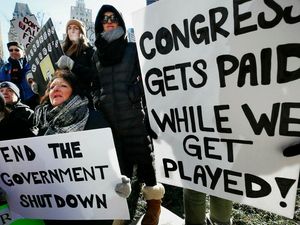US federal workers get blank payslips as shutdown drags on
An estimated 800,000 government employees missed their wages for first time since the shutdown began three weeks ago.

US public sector workers missed their first payday of the year on Friday as anxieties about mortgage payments and unpaid bills deepened.
An estimated 800,000 government employees missed their wages for first time since the shutdown began three weeks ago.
Employees posted pictures of their blank payslips on Twitter and vented their frustration as the stand-off entered its 21st day. This weekend, it will become the longest shutdown in US history.
Some Democrats seized on the empty payslips as a way to renew criticism of President Donald Trump, who triggered the shutdown over his demands for funding for a border wall.
Senator Tim Kaine of Virginia tweeted: “It should be payday for hundreds of thousands of federal workers. But thanks to Trump, many are actually getting pay stubs like this. He’s treating them like the countless contractors he stiffed throughout his business career.”
Roughly 420,000 federal employees were deemed essential and are working unpaid. An additional 380,000 are staying at home without pay. While furloughed federal workers have been given back pay in previous shutdowns, there is no guarantee that will happen this time.
Government contractors, who have been placed indefinitely on unpaid leave, do not get compensated for lost hours.
The typical federal employee makes 37 US dollars (£29) an hour, which translates into 1,480 dollars (£1,153) a week, according to the US Labour Department’s data.
Many workers live payslip to payslip, despite the strong economy and the ultra-low unemployment rate, and would struggle if their wages or salaries were interrupted. A Federal Reserve survey in May found that 40% of Americans would have to borrow or sell something to make a 400 dollar (£311) emergency payment.
Government workers are scaling back spending, cancelling trips, applying for unemployment benefits and taking out loans to stay afloat. Some are trying to land second jobs.





